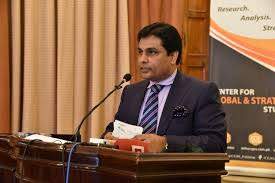ISLAMABAD, (Parliament Times) : The All Pakistan Business Forum (APBF) President Syed Maaz Mahmood has called for quick and serious steps to sustain the growth of the industry, as the businesses have been facing severe financial crunch amidst, soaring fuel & energy cost, worse power shutdowns, delaying sales tax refunds and rising markup rate.
Syed Maaz Mahmood stressed the need for increasing ease of doing business, lowering cost of production, paying early refunds to the industry to solve liquidity crunch, relaxing import policy for industrial raw material, and equalizing the energy tariff across the country.
APBF Chairman Ibrahim Qureshi said that Pakistan’s core issue is the high cost of doing business, which the government needed to bring down to bring the industry at par with global competitors.
He asked the government to work on a fast track plan to address energy issues too. Priority should be given to the industrial sector, which was the highest value-added link in the entire value chain.
Ibrahim Qureshi called for exemptions from power outages for exporting SMEs, as the power crisis across Pakistan has intensified and overall electricity shortfall getting worse.
Syed Maaz Mahmood asked the authorities to take quick action, taking notice of forced load shedding in the industry, as it would not be able to meet timely shipments due to closure of one shift while local supplies of goods also face problems.
We should adopt an alternate strategy, as Pakistan does not currently have a fuel shortage and the nation can divert supplies to high priority sectors like power generators in emergency situations. The government will have to attempt to boost energy conservation, cutting working hours for public servants and ordering shopping malls to factories to shut early in various cities including Karachi. LNG prices have surged as Europe ramps up imports of the super-chilled fuel amid mounting concerns that Russia will cut pipeline gas supply. An outage at a key US export facility has led to further tightening.
According to reports, Pakistan bought almost half of its LNG on the spot market last year, with the rest coming under long-term deals. The tender attracted an offer for only one of four cargoes being sought, and was priced at almost $40 a million British thermal units, about quadruple the rate Pakistan paid a year ago. Pakistan turned down the high priced offer, as expensive fuel imports are starting to hit consumers because Pakistan continues to increase domestic prices to meet a key condition to secure a crucial bailout from the International Monetary Fund. The government needs at least $41 billion in the next 12 months to tide over the economic crisis. Pakistan is not the only cash-strapped emerging nation struggling to secure LNG in a tight global market.
The industries are facing long durations of power breakdowns, as many units have closed down their two shifts production owing to non-availability of power.
The APBF President urged the government to end load shedding from the industrial area as power interruption is causing drastic effects on production and exports. He feared power outages would lead to an alarming rise in unemployment in the industries and urged the federal government to immediately resolve the issue. The prime minister should take immediate steps and if it’s not resolved, the situation may become more serious, he added.

